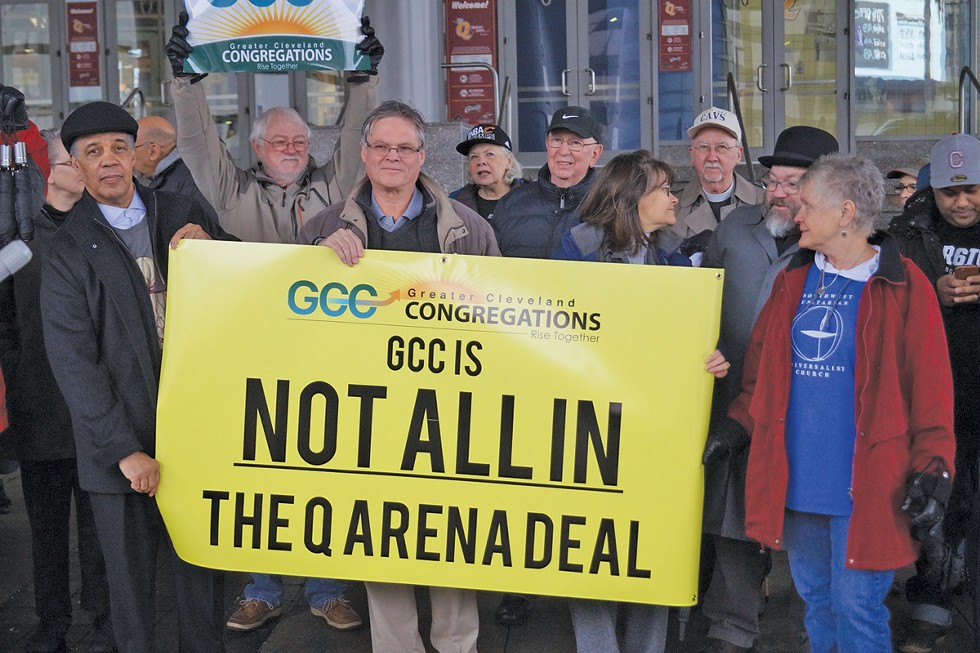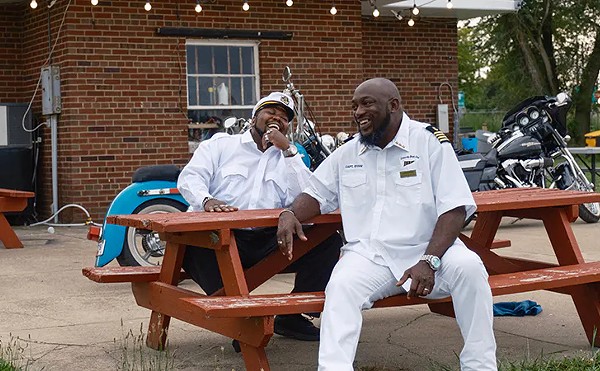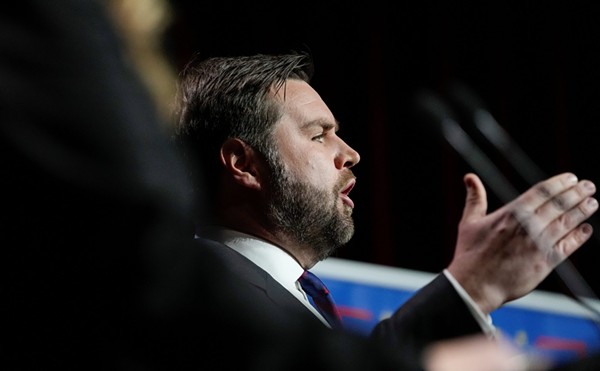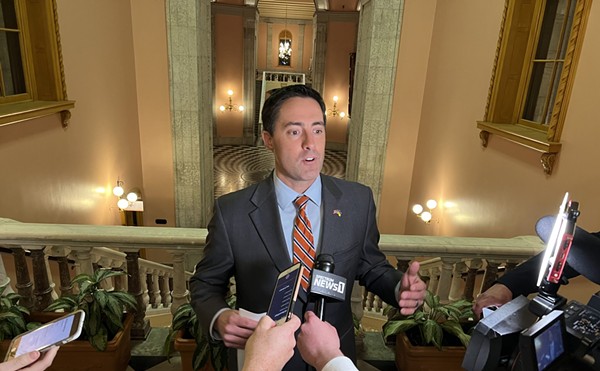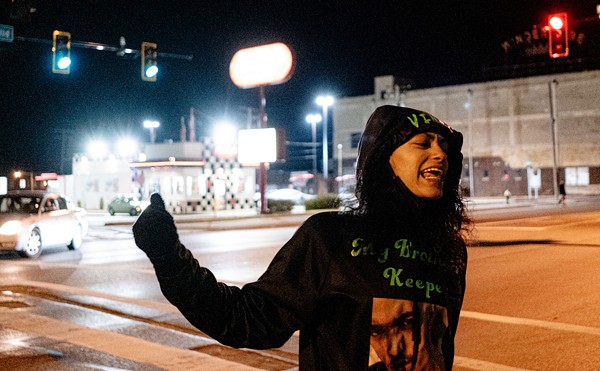On Sept. 30, after two years of construction, the Rocket Mortgage Fieldhouse will open its renovated doors to the public; that is, to members of the public with tickets to the Black Keys. With massive new frontage on Huron Road, an endoskeletal curtain of LED panels, 42,000 square feet of wide-open atrium space and a very weird name, the downtown arena will be, in many visible respects, transformed.
Until recently, the facility where the Cleveland Cavaliers play was known as Quicken Loans Arena, named after owner Dan Gilbert's Detroit-based mortgage lending company. The costly upgrades of the past two years were financed both with Gilbert's own cash and a slew of public bonds, the principal and interest on which the city of Cleveland, Cuyahoga County and Destination Cleveland, the region's tourism bureau, will be paying down every six months until 2034.
Acquiescing to this financial arrangement — what leaders in Northeast Ohio have referred to since late 2016, without a trace of irony, as a "public-private partnership" — was surely one of the most shameful, spineless, heedless acts by local elected officials in recent years. Not only did the city and county happily mortgage portions of their futures to line Gilbert's pockets, they desecrated basic tenets of democracy in the process.
No accounting of the tenures of Cleveland Mayor Frank Jackson, Cuyahoga County Executive Armond Budish and Cleveland City Council President Kevin Kelley will be complete without underscoring this odious episode: the one where they sold out their constituents, residents of the second-poorest city in the country, for a billionaire.
There was, however, an inspiring countervailing force.
Through the first half of 2017, during what were characterized — again, without irony — as "negotiations," elected leaders' cowardice and stupidity were challenged, exposed and ridiculed by a powerful grassroots opposition movement.
Led by the Greater Cleveland Congregations (GCC), a regional organization of faith groups, the #NotAllIn campaign effectively fought back against the propaganda of the Q Deal. Organizers refused to take for granted the conventional wisdom about the deal's merits and demanded more money from Dan Gilbert, better stewardship from elected leaders, and a modicum of honesty from the news media.
Hundreds of progressive activists and allies joined the cause. It was the most powerful and well-coordinated organizing campaign Cleveland had seen in decades. The issue, which became shorthand for the city's "Downtown vs. Neighborhoods" debate, resonated with Clevelanders for obvious reasons. For starters, the vast majority of them weren't regular, or even irregular, attendees of events at the arena. By the Cavs' own estimates, Cleveland residents made up only 10 percent of ticket holders at Cavs games, and only 5 percent at concerts and other events.
Moreover, this was months after a citywide income tax increase, premised (per Frank Jackson) on the desperate need for additional resources to pay for essential city services. Infrastructure was crumbling; infants were dying; children were being poisoned by lead in their homes; teenagers were attempting or committing suicide at higher rates than in any other city in the country, in many cases to escape the gun violence ravaging their neighborhoods; bus fares were continuing to rise; wages weren't.
Why on earth, given these realities, would the city devote long-term precious resources to the Q? Cuyahoga County — what was in 2017 still regarded as a legitimate government entity — had "maxed out" its credit card, and the public was already paying through the nose for capital expenditures at all three downtown sports arenas via the sin tax on cigarettes and alcohol. That tax had been renewed by county voters in 2014 after an expensive propaganda campaign financed largely by the teams. 'Keep Cleveland Strong,' the yard signs threatened.
City Council was not interested in any of this. Their top priority in early 2017 was securing a supermajority so that they could pass the Q Deal legislation as an emergency measure. Frank Jackson and Kevin Kelley ultimately managed to persuade anti-deal Councilman Brian Cummins to join the pro-side, promising support in what was shaping up to be a contentious election in his Ward 14. (Jackson and Kelley's support didn't amount to much; Jasmin Santana defeated Cummins later that year.)
But Council got its two-thirds majority. The city was to be responsible for the largest chunk of public funding, and the ordinance greenlit a projected $97 million in revenue from future admissions taxes at the Q. This is revenue that was then (and still is) paying off cost overruns on the original Gund Arena construction. It was scheduled to be unencumbered in 2023, meaning that the city could at last begin using it to pay for essential city services. But it will now go toward paying down the renovation bonds.
The sole purpose of passing the legislation as an emergency ordinance was to preemptively block, or at least complicate, a citizen referendum drive.
But the referendum drive came anyway. The Service Employees International Union (SEIU) 1199 and the Cuyahoga County Progressive Caucus, an outgrowth of the Northeast Ohio Bernie Sanders campaign, joined forces with GCC to gather more than 20,000 signatures to take the Q Deal ordinance to a vote, a display of civic force by which even many activist leaders were surprised.
Kevin Kelley and city council's lawyers conspired to block the signatures with a bogus constitutional argument. They were now not only subverting the will of the people via legislative underhandedness, but actively working against them, spending nights and weekends in dedicated service to the idea that their constituents should not have a say in how the city's dollars are spent.
Naturally, the #NotAllIn campaign amassed further energy and righteousness in response. And despite letters from the titans of Cleveland's business community in support of the deal, the Supreme Court of Ohio sided with the referendum seekers. (Frank Jackson, who'd previously called the deal "one of the best the City of Cleveland has ever made," tried to spin the Supreme Court case as a neutral adjudication of two equally valid interpretations of the law.) The Supreme Court was clear: Kevin Kelley and Council Clerk Pat Britt had overstepped their authority. The Q Deal legislation would go to a vote.
This was an outcome that Dan Gilbert and local elected leaders could not abide. It was to be a vote in the City of Cleveland only, so the referendum would not have the benefit of support (as the Sin Tax did) from whiter and wealthier voters in the suburbs.
The battle, almost unbelievably, seemed won. It was said to be the first time in the United States that a grassroots campaign had stood up to sports franchise owner and defeated him. It was historic.
That is, until the Greater Cleveland Congregations caved, snatching defeat from the jaws of victory.
Despite the opposition's broad coalition of organizations and volunteers, GCC had lead the charge all along and held the trump cards. The five signatories on the referendum petitions were all GCC members. And so in late August, 2017, they were able to withdraw the petitions unilaterally, eliminating the possibility of a vote and clearing the pathway for the gussying up of Gilbert's palace — "Cleveland's living room," in the promotional language.
GCC went into spin mode immediately. Its leaders said they had secured a good-faith commitment from Armond Budish, through mediators, to explore the idea of building mental health crisis centers, one of three central asks when they initially pitched a "Community Equity Fund" to complement the deal.
But everyone sensed there had been pressure behind the scenes. Four of the 43 dues-paying member congregations — including Armond Budish's own Park Synagogue — had already abandoned GCC because of growing controversy and intra-church tension, and others were thought to be on the precipice. Congresswoman Marcia Fudge was exercising her influence as well, reportedly making calls to church leaders and asking "what it would take" to kill the deal.
At the time, top GCC members told Scene that the withdrawal had been a strategic decision. Scene had reported in considerable depth on the deal and the #NotAllIn campaign, and we were assured that the details of this larger strategy would be revealed to us in due course.
That never happened.
Two years later, GCC is nowhere to be found on the activist scene. Whatever happened to them? What grand strategy was afoot? And what have new local activist coalitions learned from GCC's mistakes?
* * *
To answer these questions, we first went directly to the source: the GCC "Strategy Team" — more or less its board of directors. The two most visible pastors back in 2017 had been Jawanza Colvin, of Olivet Institutional Baptist Church, and Richard Gibson, of Elizabeth Baptist Church. Both are Strategy Team members.
Colvin's secretary took a message but said he was unlikely to have time for an interview. Gibson advised via email that he wasn't the person to talk to, but said he'd meet with the strategy team to think about a response. Rev. John Lentz, of Forest Hill Presbyterian Church, said he wasn't the person to talk to either. Same with Rev. Linda Robinson, (who was also one of the five signatories on the Q Deal petitions). Rabbi Rob Nosanchuk, of Fairmount Temple, was traveling, but said he'd meet with GCC organizers and the strategy team to provide a response.
Ultimately, GCC organizer Thomas Nobbe sent the following message, attributed to Rabbi Nosanchuk:
"GCC remains focused on its work around criminal justice, gun violence reduction, education and health equity issues. We have been particularly focused on building a coalition to push for a pre-booking mental health and addiction crisis center in Cuyahoga County that would keep individuals in crisis from being needlessly incarcerated and thus reducing the jail population. We are making great progress and will have more to report in the next number of months."
Our reporting found that GCC has indeed been meeting regularly with Prosecutor Michael O'Malley and Judge John Russo about the mental health crisis centers. But in May, Donna Weinberger, the Strategy Team member who's been leading the criminal justice efforts, said that while they were "continuing to push for" the crisis centers, they weren't ready to go public beyond that point. Unsubstantiated rumors have been swirling that a location has been found and money has been located for at least one such crisis center. Meanwhile, County Executive Armond Budish has repeatedly insisted that the crisis centers were never promised. Until a U.S. Marshals report documenting inhumane conditions at the jail, and eight deaths in the second half of 2018, he never showed any interest in them.
GCC's real strategy over the past two years, say current members, has been recruitment. GCC calls it their "strengthening power" campaign. The goal has been to take a step back and find ways to re-energize — in some ways to re-start — the organization after the Q Deal debacle. It's what one member, who spoke on condition of anonymity, called "retrenchment mode."
"GCC's not been doing nothing," the member said. "They've been doing close to nothing. The main goal has been to recruit new institutions. They're a little cagey with the numbers, but they've had some success."
Another source with knowledge of GCC's operations in 2017 said that what should have happened after the petitions were withdrawn was a public apology to the community.
"Everybody within GCC was crushed," they said, "But instead, they turned inward. The strategy was to protect the organization."
Two other members agreed, saying that the rationale for withdrawing the Q Deal petitions was nothing less than the survival of the organization. There was an understanding that enormous pressure had been exerted, but members were not apprised of the specific pressure points at the time.
"Among the rank and file membership, nobody knew anything about it," one source said. "It was like, what the fuck happened? It showed some of us how ensconced and calcified the power structure in the county is."
Even pastors who were ostensibly part of the leadership team weren't entirely in the loop, one Pastor told Scene. There were accounts of Marcia Fudge phone calls, of "big money" on the line for at least one Synagogue. Toby Cosgrove, the Cleveland Clinic's departing top man, was said to have made calls on local leadership's behalf. Carole Hoover, the daughter of former Olivet pastor and civil rights activist Odie Hoover — and a Frank Jackson confidante — was rumored to be in on the action as well. In the same way that Dan Gilbert had personally lobbied City Council to win support for Q Deal legislation, the biggest wigs in town were hopping on phones to try to fracture GCC.
But this was all secondhand. It was all "a big secret."
GCC leadership, in a 2017 email to members, did say that individual meetings could be scheduled to answer questions.
"It was a classic back-room deal," one GCC member said. "But the thinking was that moving forward with the referendum would pose an existential threat [to GCC.]
Steve Holecko, the political director of the Cuyahoga County Progressive Caucus, agreed with the assessment, saying he "felt sorry for" GCC organizer James Pearlstein during that time.
"He was in a position that he knew would make the organization look bad, but he felt he had to go through with it." Holecko said. "There was always a disconnect between GCC and the rest of us. Are you in this to make a deal or are you in this to stop the renovations through the referendum process? For the people who signed and circulated petitions, it was never presented to them that this was to leverage a deal, and it would have been difficult to get support if it had been presented that way. GCC knew that."
Yvonka Hall, one of the CCPC's leaders and spokespeople at the time, said GCC's last-minute maneuver "caught everyone off guard." There had been an assumption that if a deal were being considered, CCPC and SEIU would be consulted. But that didn't happen.
"GCC was the only agency with its names on the petitions," she said. "We learned the hard way that we could never do anything like that again."
Holecko said that progressive activists had been "fired up" to go through the referendum process. "The atmosphere was ecstatic," he said. And he still feels that while GCC had the legal right to withdraw the petitions, they had a moral right to communicate their intentions to the broader activist community. Immediately after the withdrawal, GCC leadership retreated. They were seldom available for public comment.
Organizer James Pearlstein had been providing Scene with regular updates. But after the withdrawal he went almost completely dark. He suggested that more information would be available at a later date. Pearlstein is no longer with GCC; he moved to Washington D.C. in 2018. He declined to be interviewed for this story.
Yvonka Hall still speaks with rage about the Q Deal, and what it says about the region's priorities. And while she was frustrated with GCC, she said that they are still welcome to participate in local progressive activist causes.
"They've been specifically invited to the table when we've formed other [issue-based campaigns]," she said. "We're a small community and we have to coalesce. But honestly, right now they're off the radar."
* * *
When Cleveland Lead Advocates for Safe Housing (CLASH), the coalition that forced City Hall to act on lead poisoning, announced in early 2019 a comprehensive piece of legislation that they planned to take to the ballot, representatives from seven member organizations stood together for the press conference: Cleveland Lead Safe Network (CLSN), the Single Payer Access Network (SPAN), the Cuyahoga County Progressive Caucus, Black Lives Matter Cuyahoga County, Cleveland End Poverty Now Coalition, Organize Ohio, and the Cleveland Democratic Socialists of America (DSA).
GCC had been asked to participate — many thought the lead issue would be a natural fit for them — but they ultimately declined, opting to focus on their Strengthening Power campaign.
One CLASH member who worked with GCC in 2017 said that it's difficult for an organization to focus on recruitment when "the lifeblood of any organization is action."
"The Q Deal [opposition] was the most meaningful challenge to the local power structure in decades, and now they want to just go out and talk to other congregations? People can smell bullshit. But people also don't want GCC to lose credibility because it's such a huge power base."
Among the lessons that activists learned from the Q Deal campaign, several mentioned that there hadn't been a deep enough understanding of, and appreciation for, the various power dynamics at work in the county. Back-room deals can happen when powerful people operate in the shadows.
That's why a group has now formed to "Power Map" the county, the goal of which is to educate activists and to build power for themselves, to move from single-issue campaigns to lasting political power.
A current member of GCC, who was also involved in the CLASH efforts, told Scene that the immediate and most obvious takeaway was the need for broader representation on petitions and among decision makers.
"There was a deliberate effort, by CLASH, to ensure that it would take a broad consensus to deviate from any plan," they said. "That was the problem with the Q Deal. One institution controlled everything. And even within GCC, the way it's structured, a major decision could be made by a small number of people."
But it's important to remember, the GCC member said, that GCC is made up of people who aren't, strictly speaking, activists.
"It skews, older, whiter, more well-connected," they said. "They tend to be involved because they love their church or synagogue and have a vague sense of injustice. It's so different from the activists in CLASH, who are begging for an invitation to the next protest."
While these are totally different worlds, both are required to make lasting change.
"GCC will always have power because they can get 1,000 people in a room. And look, you need the retired white ladies from Cleveland Heights, and you also need the Yvonka Halls of the world," the GCC member said. "When they're both rowing in the same direction, that's when you can run a winning campaign."
Randy Cunningham was standing behind the lectern at the CLASH press conference, representing both the Progressive Caucus and the Democratic Socialists of America, describing himself as a "graybeard emeritus member."
Cunningham is also something like the dean of local community organizing, and certainly its resident historian. He told Scene that the lessons from the Q Deal are similar to lessons that community organizers learned a generation ago.
Current progressive activists must ask two questions, he said.
"The first is, how do you fund sustainable organizing without becoming hostage to your funders? Who needs the FBI," he asked, "when you have the foundations? The foundations talk a big game about social change, but their real goal is to define the paradigm of issues and maintain control of the grassroots."
The second question, Cunningham said, is how to make organizing the basis for political campaigns and elected office.
"Those two questions have to be answered before there's a substantial leap forward," he said. "But progress is being made. GCC was the only game in town in 2015. But look at the organizations now!"
(He referenced, with enthusiasm, the work of Black Lives Matter, including recent protests at the county jail; Clevelanders for Public Transit; and CLASH).
"These young organizers are getting so much experience from running these campaigns. These are good organizers! I'm so damn glad to see these younger people taking the reins. And I'm so damn glad to see that they're learning. CLASH could've been another Q Deal, but it wasn't. CLASH was a victory. Now the key is stringing victories together."
As for GCC, Cunningham agreed with the activists who said that before long, they'd be back, and that reconciliation would not be difficult, given the right issue. The enemy of my enemy, as the saying goes, is my friend. But Cunningham also cautioned that GCC, through no fault of its membership, will never really be interested in rocking the boat.
"If they really wanted to make change, instead of just playing at making change," he said, "the answer is to quit preaching and start meddling."

